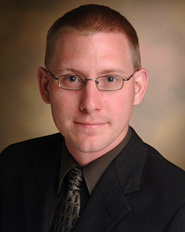
Alan Theisen (b. 4 October 1981; Port Huron, Michigan) is a Ph.D. graduate assistant in the Department of Music Theory at the Florida State University.
Composing since the age of sixteen, he has produced a steadily growing body of work distinguished by its musical energy and concentration of expression.
Representative works by Theisen include a Sonata for Alto Saxophone and Piano, Variations on a Theme of Gretchaninov, Eclogue for flute, and the Concerto for Alto Saxophone and String Orchestra (premiered by soloist Lawrence Gwozdz and the Szczecin Philharmonic in 2004). Recent compositions and commissions include Ritorno for flute and cello and a Triple Concerto. Noted composer Dimitri Terzakis commends Theisen's oeuvre as being "the product of a unique talent."
As a saxophonist, Theisen has toured the United States and Canada with the Sax-Chamber Orchestra, performing at two World Saxophone Congresses (Montreal - 2000, Minneapolis - 2003). He studied the instrument with internationally-recognized performer Lawrence Gwozdz and participated in masterclasses with famed saxophone pioneer Jean-Marie Londeix. No stranger to the podium, Theisen has been a guest conductor with several ensembles.
In an effort to showcase both his own original compositions and pieces by other contemporary composers, he founded the Intégrales New Music Festival in 2005. Now an annual event, Intégrales NMF features world-premiere performances by nationally recognized musicians. Intégrales has expanded to include musical collaborations with artists, authors, and dancers.
Theisen wrote his undergraduate thesis on György Ligeti's Piano Etudes, and has authored several papers on topics including Elliott Carter, film editing, composition as analysis, and Michael Brecker.
Other interests include mathematics, film criticism, and philosophy; in addition, Theisen has performed the role of Oberon in a production of Shakespeare's A Midsummer Night's Dream, for which he also wrote the incidental music.
Theisen lives with his wife (and puts up with their two cats) in Tallahassee, Florida.
|
|
|
|
|
|

Friday, June 05, 2009
...the adventure of it all
As contemporary artists always have, today's composers exist at a juncture between past and present. And all of us, whether we write music or perform it or listen to it, face a similar challenge: how to relate meaningfully to the past without becoming imbedded in it; how to press toward the future without abandoning the richness of our heritage. It is often remarked that some audiences seem to fear the new. To this I might add that some composers seem to fear the past. The rhetoric of "progress," as well as the worship of a canon of masterpieces can undermine the adventure of it all. And adventure is what it is all about. The audience shouldn't forget that all of the masterpieces of the past were written on blank paper. We composers shouldn't be afraid to draw on a rich legacy as we fill our blank pages with our own adventure. Having said all of this, the real subject of music, in my aesthetic, is the evolution of musical material and the parallel spiritual journey that occurs. For me, each piece is an exploration of a musical and human universe, inspired by its circumstances, but aiming at something more universal. - Ellen Taaffe Zwilich
posted by Alan Theisen
|
| |



